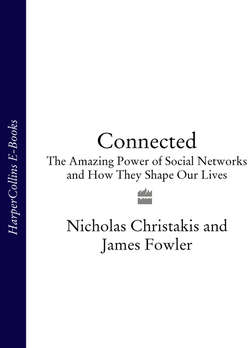Читать книгу Connected: The Amazing Power of Social Networks and How They Shape Our Lives - James Fowler - Страница 15
Connected
ОглавлениеMost of us are already aware of the direct effect we have on our friends and family; our actions can make them happy or sad, healthy or sick, even rich or poor. But we rarely consider that everything we think, feel, do, or say can spread far beyond the people we know. Conversely, our friends and family serve as conduits for us to be influenced by hundreds or even thousands of other people. In a kind of social chain reaction, we can be deeply affected by events we do not witness that happen to people we do not know. It is as if we can feel the pulse of the social world around us and respond to its persistent rhythms. As part of a social network, we transcend ourselves, for good or ill, and become a part of something much larger. We are connected.
Our connectedness carries with it radical implications for the way we understand the human condition. Social networks have value precisely because they can help us to achieve what we could not achieve on our own. In the next few chapters, we will show how networks influence the spread of joy, the search for sexual partners, the maintenance of health, the functioning of markets, and the struggle for democracy. Yet, social-network effects are not always positive. Depression, obesity, sexually transmitted diseases, financial panic, violence, and even suicide also spread. Social networks, it turns out, tend to magnify whatever they are seeded with.
Partly for this reason, social networks are creative. And what these networks create does not belong to any one individual—it is shared by all those in the network. In this way, a social network is like a commonly owned forest: we all stand to benefit from it, but we also must work together to ensure it remains healthy and productive. This means that social networks require tending, by individuals, by groups, and by institutions. While social networks are fundamentally and distinctively human, and ubiquitous, they should not be taken for granted.
If you are happier or richer or healthier than others, it may have a lot to do with where you happen to be in the network, even if you cannot discern your own location. And it may have a lot to do with the overall structure of the network, even if you cannot control that structure at all. And in some cases, the process feeds back to the network itself. A person with many friends may become rich and then attract even more friends. This rich-get-richer dynamic means social networks can dramatically reinforce two different kinds of inequality in our society: situational inequality (some are better off socio-economically) and positional inequality (some are better off in terms of where they are located in the network).
Lawmakers have not yet considered the consequences of positional inequality. Still, understanding the way we are connected is an essential step in creating a more just society and in implementing public policies affecting everything from public health to the economy. We might be better off vaccinating centrally located individuals rather than weak individuals. We might be better off persuading friends of smokers of the dangers of smoking rather than targeting smokers. We might be better off helping interconnected groups of people to avoid criminal behavior rather than preventing or punishing crimes one at a time.
The powerful effect of social networks on individual behaviors and outcomes suggests that people do not have complete control over their own choices. Interpersonal influence in social networks therefore raises moral questions. Our connections to others affect our capacity for free will. How much blame does Giacomo in Corsica deserve for his actions, and how much credit does Dan Lavis in Ontario deserve for his? If they acted merely as links in a chain, how can we understand their freedom to choose their actions at all?
Some scholars explain collective human behavior by studying the choices and actions of individuals. Others dispense with individuals and focus exclusively on groups formed by social class, race, or political party affiliation, each with collective identities that cause people in these groups to mysteriously and magically act in concert. The science of social networks provides a distinct way of seeing the world because it is about individuals and groups, and about how the former actually become the latter.
If we want to understand how society works, we need to fill in the missing links between individuals. We need to understand how interconnections and interactions between people give rise to wholly new aspects of human experience that are not present in the individuals themselves. If we do not understand social networks, we cannot hope to fully understand either ourselves or the world we inhabit.
